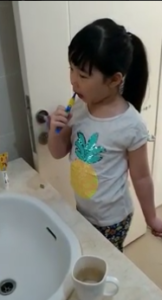By: Preschool Teachers
 Preschool-age children develop a sense of independence by practicing skills and doing things for themselves. Developing independence in children is not easy. It can take an infinite amount of patience. In order to raise a child who will become increasingly more independent as they grow older, we should teach them life skills, give them responsibilities, allow them to make their own decisions, and encourage self-confidence.
Preschool-age children develop a sense of independence by practicing skills and doing things for themselves. Developing independence in children is not easy. It can take an infinite amount of patience. In order to raise a child who will become increasingly more independent as they grow older, we should teach them life skills, give them responsibilities, allow them to make their own decisions, and encourage self-confidence.
As parents, it’s hard not to groan at the thought of our preschoolers racing for the step stool, climbing up, and then trying to pour themselves a glass of milk. Letting children carry out tasks often means that the task will take twice as long — and be three times as messy. And it can be hard to watch your child try, fail and feel frustrated or disappointed. Given how high our stress levels are at the moment, our tolerance for inconvenience and mess may be more limited than usual.
Here are some tips for teaching children to be more independent:
- Set predictable routines
 Establishing a consistent routine is important for nurturing independence. When children can anticipate their day, they are better equipped to take on responsibilities. Even the act of brushing teeth is a routine, because it has multiple steps that always go in the same order: turn on the water, rinse the toothbrush, put on toothpaste, brush, rinse, dry hands and mouth. Likewise, going outside involves putting on a jacket and shoes, maybe packing a snack, or remembering a favorite toy or doll. As children experience these routines over and over, they learn to anticipate what comes next, and they start to take on more responsibility with less help.
Establishing a consistent routine is important for nurturing independence. When children can anticipate their day, they are better equipped to take on responsibilities. Even the act of brushing teeth is a routine, because it has multiple steps that always go in the same order: turn on the water, rinse the toothbrush, put on toothpaste, brush, rinse, dry hands and mouth. Likewise, going outside involves putting on a jacket and shoes, maybe packing a snack, or remembering a favorite toy or doll. As children experience these routines over and over, they learn to anticipate what comes next, and they start to take on more responsibility with less help.
- Let your child choose
Involve them in deciding what to wear, what to play, or who to call. This does not have to mean they have free rein. Provide two or three options, and then praise their great ability to make a choice! Providing choices is especially valuable when your preschooler insists on doing something their way.
- Let your child help
When you allow your child to help, you foster their confidence and allow them to learn something new. While this may involve adding an extra step or two, it is also a great way to involve your child in daily routines and activities. For example, when making scrambled eggs, an adult might pour the milk directly into the bowl and dispose of the shells directly in the garbage. As an alternative, consider pouring milk into a small cup or pitcher and asking your child to pour it into the bowl. Likewise, collect the eggshells in a small bowl and ask your child to help dump them in the garbage.
- Give your child chores
 Simple tasks like picking up toys or putting laundry in the basket allow your child to have reasonable responsibility and help with maintaining structure throughout the day. In fact, these chores can be embedded into your daily routines. For example, part of your child’s mealtime routine can include bringing their plate to the sink or even helping load the dishwasher.
Simple tasks like picking up toys or putting laundry in the basket allow your child to have reasonable responsibility and help with maintaining structure throughout the day. In fact, these chores can be embedded into your daily routines. For example, part of your child’s mealtime routine can include bringing their plate to the sink or even helping load the dishwasher.
- Make time
When your child is not being micromanaged, they may surprise you with their co-operation, and you’ll be a calmer influence when you’re not racing against the clock.
- Let your child solve problems
Be sure to allow your child to try things that are hard and to solve (small) problems on their own. Many times, we project our stress or frustration onto children when, in fact, they are happy problem-solvers. When children are first learning to crawl or walk, we must let them fall. Similarly, when children are learning to put on their shoes, we must allow them to put them on the wrong feet. Wait until your child asks for help or provides a small hint to get them to the next step.
- Forget perfection
Accept that your child won’t do the task as well as you. If the milk spills, show your child how to clean it up without criticism and assure it happens to everyone.
- Encourage projects
Projects, which can include anything from coloring to building to puzzles to crafts, provide opportunities for children to focus their attention on a contained activity for a period of time. Commenting on and complimenting your child’s work gives them a sense of accomplishment and self-esteem, and praising your child’s effort helps with the development of grit.
- Nurture free play
 Independent and unstructured play is very important for fostering creativity, problem-solving, and autonomy. However, most preschool children will still need some engagement from parents during unstructured playtime. Offer your preschooler a variety of art materials (crayons, markers, chalk, finger paints), building materials (blocks, MagnaTiles, Legos), or imaginary play props and let them construct their own craft or play. You can also include materials that are not toys at all. You might comment on what they are doing and praise their efforts, but do not do the work for them.
Independent and unstructured play is very important for fostering creativity, problem-solving, and autonomy. However, most preschool children will still need some engagement from parents during unstructured playtime. Offer your preschooler a variety of art materials (crayons, markers, chalk, finger paints), building materials (blocks, MagnaTiles, Legos), or imaginary play props and let them construct their own craft or play. You can also include materials that are not toys at all. You might comment on what they are doing and praise their efforts, but do not do the work for them.
- What to say while they work and play
In addition to setting up opportunities for your child to build independence, it’s important for you to let them know that you see them — their efforts, their persistence, their bravery, their growth.
PRAISE: Praise your child’s appropriate behavior. This helps increase the specific behavior that you are addressing and contributes to a warm interaction with your child. For example, “I’m proud of you for tidying your toys!”
REFLECT: Reflect appropriate speech. This helps demonstrate to your child that you are listening and understanding. For example, your child says, “I made a tower.” And then you say, “You made a tower!”
IMITATE appropriate behavior and play. This gives positive attention (the most powerful reward) to good behavior and promotes cooperation. For instance, when your child builds a tower, you begin to stack blocks too.
DESCRIBE your child’s appropriate behavior. This reinforces your child’s positive play and draws their attention to it. You might say, “I see you drew a rainbow!” or, “We are building a tower together.”
Be ENTHUSIASTIC! This makes your interactions feel warmer and keeps your child interested. For example, you can use a playful voice, exaggerate your emotions when you’re talking, and smile often.
https://childmind.org/article/how-to-build-independence-in-preschoolers/
https://www.todaysparent.com/kids/teaching-kids-to-be-more-independent/


